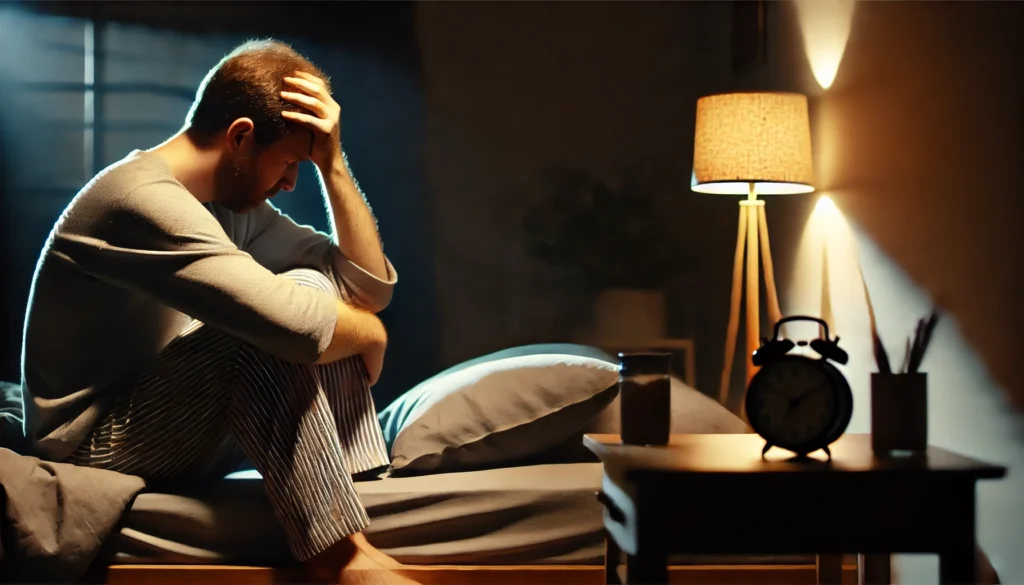The term “no sleep disorder” is often used colloquially to describe a state of chronic sleep deprivation. This misnomer arises from a misunderstanding of sleep disorders, where individuals assume a non-existent condition. Medically speaking, there is no recognized condition by this name, which often leads to misdiagnosis and inappropriate treatments. Instead, what people often refer to are symptoms of chronic insomnia or other sleep disorders that result in insufficient sleep.
Insomnia is the medical term for sleep deprivation that can lead to a plethora of issues. Unlike the mythical “no sleep disorder,” insomnia is characterized by difficulty falling asleep, staying asleep, or waking up too early and not being able to return to sleep. It’s essential to understand that insomnia is a legitimate medical condition that requires proper attention and intervention. Mislabeling it as “no sleep disorder” can trivialize the severity and complexity of the issues faced by those suffering from it.
Common Misunderstandings of Sleep Deprivation
A frequent misunderstanding is that sleep deprivation is a simple lack of sleep that can be easily remedied by a night or two of rest. However, chronic sleep deprivation is a serious issue that can accumulate over time, affecting every aspect of an individual’s life. It is not merely about feeling tired but involves a series of physiological and psychological repercussions that need to be addressed.
Another misconception is that sleep deprivation is an inevitable part of modern life. While our fast-paced society often glorifies minimal sleep in pursuit of productivity, this mindset can lead to severe health consequences. Understanding that sleep is not a luxury but a necessity can help change perceptions and encourage better sleep practices.
Myths and Misconceptions
A common myth is that insomnia is purely psychological or self-inflicted. While stress and lifestyle choices play significant roles, insomnia can also stem from underlying medical conditions, medication side effects, or even genetic predispositions. It’s a multifaceted disorder that requires a nuanced approach to treatment. Many people believe that insomnia is simply a matter of mind over matter, failing to recognize the complex interplay of various factors that contribute to its development.
Insomnia is often thought to be a condition that affects only mental health, but it has far-reaching implications for physical health as well. This misconception can lead to inadequate treatment approaches that don’t address the full scope of the problem. Moreover, the stigma associated with insomnia can prevent individuals from seeking the help they need, thinking it reflects personal weakness or failure.
You May Also Like: Understanding the Impact of Chronic Sleep Deficiencies

The Stages of Insomnia
Transient Insomnia
Transient insomnia lasts for less than a week and is often triggered by stress or environmental changes. This stage of insomnia is typically short-lived and can be caused by temporary disruptions such as travel, significant life changes, or acute stressors. While it may seem inconsequential, transient insomnia can be the precursor to more severe forms if not managed properly.
Proper management of transient insomnia involves addressing the immediate triggers and employing relaxation techniques to promote better sleep. Mindfulness practices, such as meditation or deep breathing exercises, can be beneficial in reducing stress and improving sleep quality during this phase. Educating individuals about the impact of their environment on sleep can also help mitigate transient insomnia.
Acute Insomnia
Acute insomnia persists for several weeks and may require intervention if it begins to affect daily life significantly. This stage is often a result of ongoing stress, medical conditions, or lifestyle factors that disrupt sleep patterns. Unlike transient insomnia, acute insomnia can have more pronounced effects on an individual’s health and daily functioning, necessitating a closer examination of underlying causes.
Intervention strategies for acute insomnia include cognitive-behavioral therapy, which helps individuals develop healthier sleep habits and attitudes towards sleep. Identifying and addressing specific stressors, such as work-related pressures or personal issues, is crucial in managing acute insomnia. Additionally, creating a sleep-conducive environment and establishing a regular sleep schedule can aid in alleviating symptoms.
Chronic Insomnia
Chronic insomnia, lasting more than a month, often indicates deeper health issues and necessitates a comprehensive treatment plan. This stage of insomnia can be particularly debilitating, affecting both physical and mental health. Chronic insomnia is often intertwined with other medical or psychiatric conditions, making its treatment complex and multifaceted.
A comprehensive treatment plan for chronic insomnia involves a combination of medical intervention, lifestyle changes, and psychological support. Medications may be prescribed to help regulate sleep, but they are often used in conjunction with behavioral therapies for long-term effectiveness. Understanding the root causes of chronic insomnia is essential, as addressing these underlying issues is key to successful management.
The Effects of Sleep Insomnia
The repercussions of insomnia stretch far beyond mere fatigue. Chronic sleep deprivation can lead to cognitive impairments, weakened immune function, and an increased risk of diseases such as hypertension, diabetes, and depression. Cognitive impairments include difficulties with concentration, memory, and decision-making, which can significantly impact personal and professional life.
The effects of sleep insomnia can ripple through every aspect of life, impacting productivity, mental health, and physical well-being. Individuals suffering from insomnia may experience mood disturbances, irritability, and heightened stress levels, further exacerbating their condition. Over time, the cumulative impact of insomnia can lead to a diminished quality of life and increased vulnerability to serious health issues.
Diseases Caused by Insomnia
The Domino Effect of Sleep Deprivation
Insomnia’s impact on health is profound. It is linked with a range of diseases, primarily due to its effect on the body’s restorative processes. Sleep is essential for cellular repair, memory consolidation, and hormonal balance. When sleep is compromised, these processes falter, leading to systemic health issues. The body’s inability to recover adequately during sleep can result in chronic inflammation and weakened immune responses.
For instance, chronic insomnia has been associated with cardiovascular diseases. Sleep deprivation leads to increased blood pressure and inflammation, both of which are risk factors for heart disease. Moreover, the stress hormones released during insomnia episodes can exacerbate these conditions. Understanding the connection between insomnia and cardiovascular health is vital for developing preventive strategies and promoting overall well-being.
Long-Term Health Risks
The long-term health risks associated with insomnia extend beyond cardiovascular issues. Chronic sleep deprivation has been linked to metabolic disorders, such as diabetes, due to its impact on insulin sensitivity and glucose metabolism. The body’s inability to regulate these processes effectively can lead to an increased risk of developing type 2 diabetes and other metabolic conditions.
Additionally, insomnia can contribute to weight gain and obesity, as disrupted sleep patterns affect appetite-regulating hormones like ghrelin and leptin. This imbalance can lead to increased cravings for high-calorie foods and a decrease in physical activity, further exacerbating weight-related health issues. Recognizing these long-term health risks is crucial for motivating individuals to prioritize sleep and adopt healthier lifestyles.
Mental Health Concerns
The relationship between insomnia and mental health is bidirectional. Insomnia can both contribute to and result from mental health disorders such as anxiety and depression. The lack of quality sleep exacerbates symptoms, creating a vicious cycle that is challenging to break. Individuals with insomnia may experience heightened anxiety and depressive symptoms, which, in turn, make it more difficult to achieve restful sleep.
Addressing the mental health concerns associated with insomnia requires a holistic approach that considers both psychological and physiological factors. Therapeutic interventions, such as cognitive-behavioral therapy, can help individuals develop coping strategies and improve their sleep hygiene. Additionally, fostering a supportive environment and encouraging open discussions about mental health can reduce the stigma surrounding insomnia and promote better outcomes.

The Medical Perspective: Insomnia Writeup
Diagnosing Insomnia
A thorough insomnia writeup from a healthcare provider includes a detailed history and physical examination. Sleep patterns, lifestyle factors, and medical history are scrutinized to identify potential causes. Physicians may inquire about sleep habits, stress levels, and any underlying medical conditions to gain a comprehensive understanding of the individual’s sleep issues.
In some cases, polysomnography, or sleep studies, may be conducted to rule out other sleep disorders like sleep apnea. These studies provide valuable insights into sleep architecture and help identify any abnormalities contributing to insomnia. Accurate diagnosis is essential for developing an effective treatment plan tailored to the individual’s unique needs.
Treatment and Management
Effective management of insomnia involves a combination of cognitive-behavioral therapy (CBT), lifestyle modifications, and, in some cases, medication. CBT for insomnia focuses on changing sleep habits and misconceptions about sleep, while medications may be used temporarily to re-establish a sleep routine. Behavioral therapies emphasize the importance of establishing regular sleep schedules and creating conducive sleep environments.
Lifestyle changes such as maintaining a consistent sleep schedule, creating a restful sleeping environment, and avoiding stimulants like caffeine and electronic screens before bed are foundational to improving sleep quality. Encouraging relaxation techniques, such as meditation or yoga, can also help reduce stress and promote better sleep. Collaboration between healthcare providers and patients is crucial for successful treatment outcomes.
Emerging Therapies
Emerging therapies for insomnia are continually being explored as researchers seek innovative solutions to this pervasive issue. One promising area of research involves the use of light therapy to regulate circadian rhythms and improve sleep quality. This therapy involves exposure to specific wavelengths of light at strategic times to mimic natural sleep-wake cycles.
Another emerging approach is the use of digital therapeutics, such as apps that provide personalized sleep coaching and behavioral interventions. These tools can offer tailored support and guidance, helping individuals develop healthier sleep habits over time. As technology continues to advance, the potential for novel therapies to enhance sleep quality and overall well-being is vast.
Future Implications and Research
Advances in Sleep Science
Research into sleep disorders is continually evolving. Scientists are exploring the genetic components of insomnia, the role of gut health in sleep regulation, and the potential of nootropics to enhance sleep quality and cognitive function. The exploration of genetic markers associated with insomnia could lead to more targeted and effective treatments, offering hope for those with treatment-resistant conditions.
Gut health has emerged as a significant factor in sleep regulation, with studies indicating that the gut microbiome plays a role in sleep patterns and quality. Understanding this connection could lead to new dietary recommendations and probiotic interventions aimed at improving sleep health. Additionally, the exploration of nootropics, or cognitive enhancers, offers potential for optimizing both sleep and cognitive performance.
The Role of Technology
Technology is playing an increasingly significant role in sleep management. Wearable devices and apps that track sleep patterns and provide feedback are becoming popular tools for individuals seeking to understand and improve their sleep habits. These devices offer insights into sleep duration, quality, and disturbances, empowering users to make informed decisions about their sleep health.
The integration of artificial intelligence and machine learning in sleep technology promises further advancements in personalized sleep solutions. AI-driven algorithms can analyze vast amounts of sleep data to identify patterns and recommend individualized interventions. As technology continues to advance, its role in sleep science is likely to expand, offering new opportunities for improving sleep health and overall well-being.
The Global Perspective
Sleep disorders are a global concern, affecting individuals across diverse cultures and regions. Understanding the cultural and environmental factors influencing sleep is crucial for developing effective interventions that resonate with different populations. Research into cross-cultural sleep practices and beliefs can provide valuable insights into how sleep is perceived and managed worldwide.
Collaboration between international researchers and healthcare professionals can facilitate the exchange of knowledge and the development of culturally sensitive approaches to sleep management. By considering the global perspective, we can work towards comprehensive solutions that address the unique challenges faced by individuals in different parts of the world.

Conclusion: Debunking the Myths
In conclusion, the myths surrounding “no sleep disorder” and insomnia need to be dispelled. Understanding the complexities of sleep disorders is the first step toward effective management and improved health outcomes. By recognizing the multifactorial nature of insomnia, individuals can better address their sleep issues and work towards a healthier, more balanced life.
For health and wellness coaches, science journalists, and biohackers alike, the key is to remain informed and critical of the information available, continually seeking evidence-based strategies to enhance sleep and overall well-being. Education and awareness are powerful tools in combating misinformation and promoting better sleep practices.
In the battle against insomnia, knowledge is your greatest ally. By staying informed and embracing a holistic approach to sleep health, individuals can improve their quality of life and reduce the burden of insomnia-related health issues. Through continued research and collaboration, we can uncover new insights and develop innovative solutions to support better sleep for all.
Further Reading:
Circadian Rhythm Sleep Disorders
Depression and Sleep: Understanding the Connection
Important Note: The information contained in this article is for general informational purposes only, and should not be construed as health or medical advice, nor is it intended to diagnose, prevent, treat, or cure any disease or health condition. Before embarking on any diet, fitness regimen, or program of nutritional supplementation, it is advisable to consult your healthcare professional in order to determine its safety and probable efficacy in terms of your individual state of health.
Regarding Nutritional Supplements Or Other Non-Prescription Health Products: If any nutritional supplements or other non-prescription health products are mentioned in the foregoing article, any claims or statements made about them have not been evaluated by the U.S. Food and Drug Administration, and such nutritional supplements or other health products are not intended to diagnose, treat, cure, or prevent any disease.


